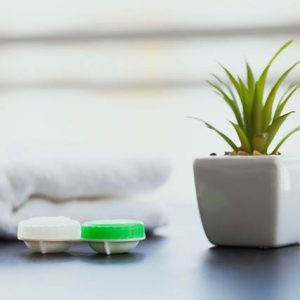Is it safe to wear contact lenses while swimming in a pool, lake or ocean?
The simple answer is: No.
Wearing contact lenses while submerged in water is not recommended.
Bacteria and microbes thrive in water, which can be found in swimming pools, oceans, lakes, and even hot tubs. While our bodies have an inbuilt defense system to protect us from certain microorganisms, a waterborne eye infection is still possible.
Risks of swimming while wearing contacts
Contact lenses shouldn’t be exposed to any type of water, except their prescribed cleaning and storage solutions.
In fact, swimming while wearing contacts can be particularly dangerous due to the prolonged exposure to water-born pathogens.
Contact lenses can absorb water, trapping dangerous pathogens against your eye.
Swimming with contacts in lakes, rivers, and oceans is riskier than swimming in a pool. This is because bacteria, viruses, and other harmful organisms are more likely to be found in natural bodies of water. Pool chemicals offer some protection against such organisms.
However, this doesn’t mean it’s safe to wear contact lenses when swimming in a pool. Chlorine and other pool chemicals do not destroy all pathogens and pool chemicals themselves, such as chlorine, can still cause chemical burns on your eyes.
Swimming while wearing contact lenses may increase your risk of:
- Eye infections
- Corneal ulcers
- Eye inflammation (uveitis)
- Corneal abrasion or scratch
- Eye irritation due to lenses sticking to your eyes
- Dry eye syndrome, especially when swimming in a chlorinated pool or saltwater
SEE RELATED: Common Contact Lens Problems
If you want to wear your contact lenses whilst swimming, contact an eye doctor near you to discuss the options.
Top 8 Safety tips for swimming with contact lenses
Despite the dangers, many people choose to swim with contact lenses in a pool or at the beach. While eye doctors are strongly opposed to it, they’re aware of the reality.
Important note: The following information should not be construed as medical advice; always see your eye doctor before swimming with contact lenses. Individual risk assessments and safety instructions will be discussed with your eye doctor.
To minimize danger to your eyes, here are some tips:
- Wear goggles to avoid having water touch your contacts – Any goggle that fits tightly will help keep water out of your eyes and away from your contacts. Consider investing in a pair of prescription goggles if you swim frequently.
- Prescription goggles – Being able to see clearly with prescription goggles will eliminate the need for contact lenses.
- Immediately after swimming, take out your contact lenses – Contact lenses should be removed and disinfected. After that, either wipe your eyes with clean water and put your glasses on, or replace your contact lenses with a clean new pair.
- Disinfect your lenses – After swimming with contacts, disinfect your lenses in contact lens solution for 24 hours.
- Consider dailies – Wearing daily contact lenses allows you to throw them away immediately after swimming.
- Use artificial drops or tears – Using artificial tears or rewetting drops before and after swimming can reduce the risk of dry eyes but not eye infections.
- Rigid gas permeable lenses – If you’re a competitive swimmer, your doctor might recommend that you wear rigid gas permeable contact lenses at night to reshape your cornea. This may eventually eliminate the need to wear contacts during the day.
- Laser Surgery – You might want to consider undergoing laser eye surgery to help correct your vision so that you don’t have to worry about contact lenses at all.
LEARN MORE: Guide to Contact Lenses
Schedule an appointment with an eye doctor near you to help you figure out the safest, most suitable way to enjoy your contact lenses while in the water.
If you enjoy wearing your contact lenses and being in the water, a discussion with your eye doctor is the best way to ensure your safety and maintaining your eye health.









